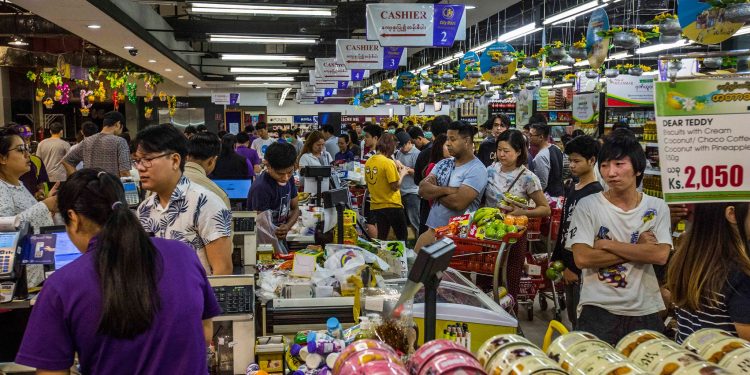Myanmar’s junta has imposed new restrictions on the import of overseas goods, raising fears of shortages and rising commodities prices.
The Department of Consumer Affairs under the junta-controlled Ministry of Economy and Commerce released an announcement about the new restrictions on April 26 on the order of regime chief Min Aung Hlaing.
The announcement referred to a March 28 meeting of the Economic Affairs Committee in which Min Aung Hlaing said: “To avoid a trade deficit we shall not import goods from overseas that we are able to manufacture in this country, and we shall scrutinize and import only goods that it is not possible to produce in the country.”
However, according to statistics released by the Ministry of Economy and Commerce, Myanmar’s foreign trade sector already had a trade deficit of more than US$414 million over the first nine months of the 2022–2023 fiscal year.
Citing the junta chief, the Department of Consumer Affairs is scrutinizing which goods will be banned from being imported, along with region and state departments, the Union of Myanmar Federation of Chambers of Commerce and Industry and other related business bodies.
Economists have said that restricting imports is not the way to avoid a trade deficit, and that the Myanmar people will suffer because of the import ban.
Since early 2022, the military regime has reduced imports of fuel and cooking oil in a bid to prevent a trade deficit.
“We need to reduce imports of cooking oil, while working to improve domestic production given that we have plenty of resources in our country,” said Major General Zaw Min Tun, the junta spokesperson, at a July 2022 press conference.
Although Myanmar is able to produce fuel and cooking oil, it cannot produce enough to meet domestic demand. Economists have also said that certain goods and commodities need to be imported to satisfy domestic demand.
So far, the relevant ministries and departments have yet to come up with a specific list of goods and commodities that will be banned from being imported, but officials are performing more inspections of consumer goods, ranging from aluminium and glass-related materials to phone covers, said importers.
“Instead of trying to promote exports, the regime is attempting to reduce imports and that is absolutely the wrong solution. It highlights the fact that the regime has a very low amount of foreign exchange currency,” said a 41-year-old Yangon economist who wished to remain anonymous.
He added that many countries around the world are facing trade deficits, but the junta chief’s strategy is mistaken and could drive the economy to ruin.
Business people and residents of Yangon, Myanmar’s commercial capital, said that if the regime restricts the importation of necessary commodities, goods and materials, prices for them will increase excessively and there will also be shortages.
Young people who The Irrawaddy talked to said that they prefer using imported brands, including cosmetics and electrical appliances, because they are of higher quality than domestically-produced brands.
Ma Khin Khin, a 27-year-old accountant working in Yangon, said she felt upset when she heard of the junta’s plans to force people to use only goods and commodities produced in Myanmar.
“I think Min Aung Hlaing is already crazy. He and the other regime leaders and their families are using the world’s most famous brands like Gucci and LVMH. I want to ask them if they will also only be buying domestic brands.”

















